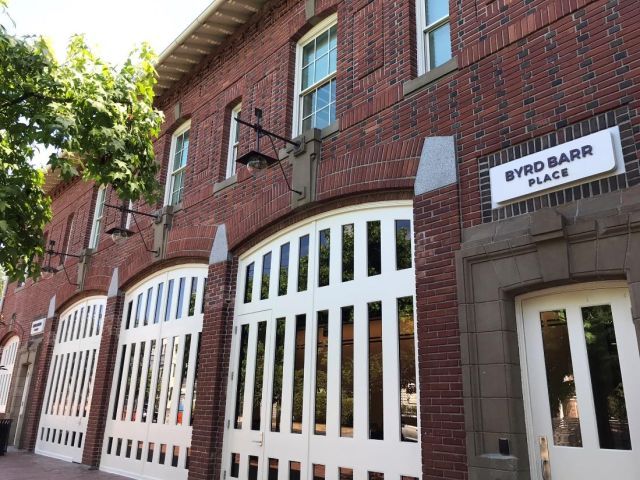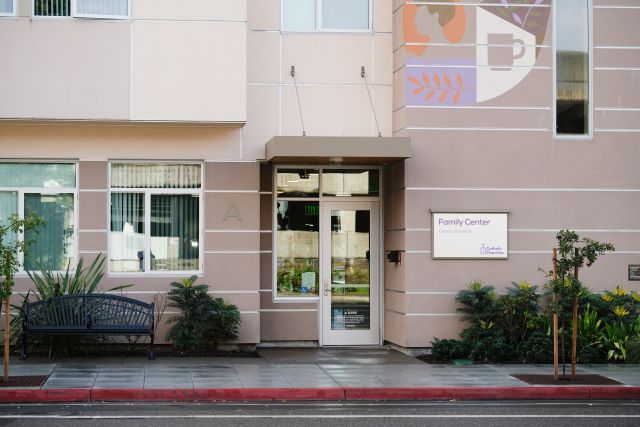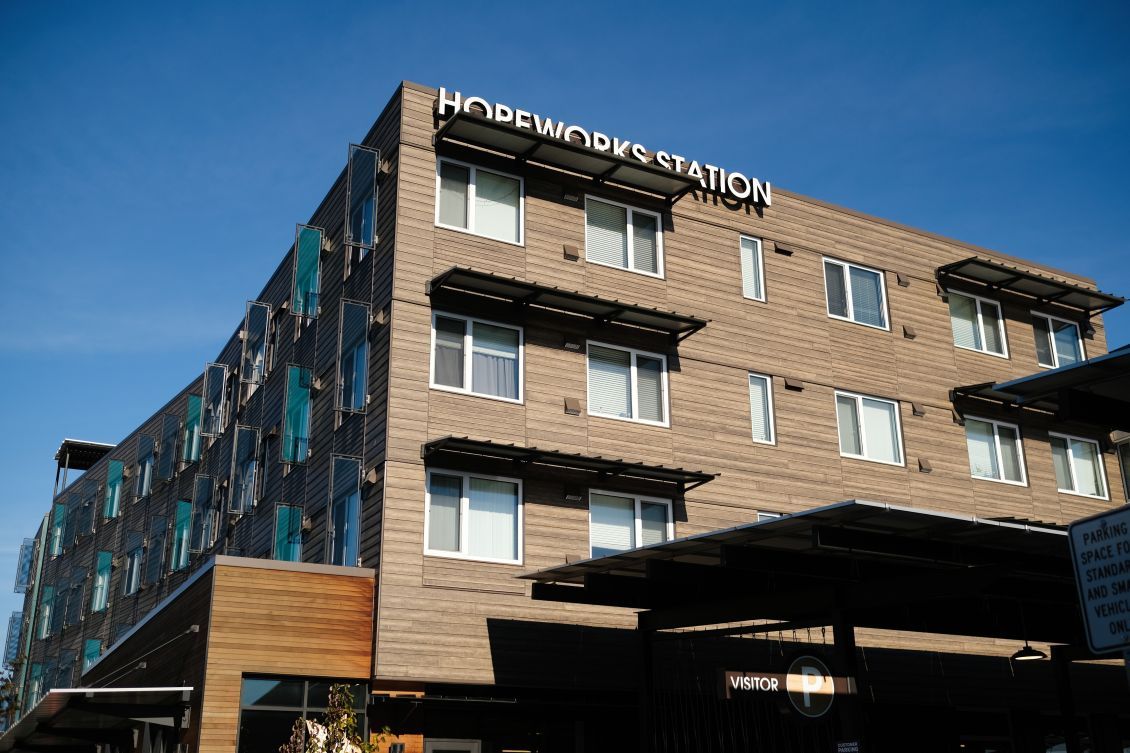This piece is part of our series, Policy Actions for Racial Equity (PARE), which explores the many ways housing policies contribute to racial disparities in our country.
Byrd Barr Place – a Black-led nonprofit in Seattle that provides safety net services, programming, and advocacy to help local residents move from poverty to self-sufficiency – recently reopened its headquarters in a renovated former fire station. The organization was able to reopen in this renovated location thanks to $7 million in funding from Enterprise through the New Markets Tax Credit (NMTC), an innovative financing program that stimulates economic growth in low-income communities.
The renovations will enable Byrd Barr Place to serve 20,000 people annually – 4,500 more than before, with services that include computer literacy classes for seniors, a climate-controlled pantry, eviction prevention services, and financial assistance with utility bills.
The Byrd Barr Place headquarters is just one of over 8,000 transformative projects supported by $130 billion in private investment made possible by NMTCs. Over the last 24 years, the NMTC program has been particularly impactful for communities of color that have suffered from historic disinvestment.

The program provides crucial capital for minority-owned businesses, supports the development of affordable housing, and finances community facilities like schools and health care centers. While the program has built a successful track record over the last two decades, Congress has yet to make the program permanent, instead making short-term extensions that leave communities uncertain about the future of this important resource.
A model public-private partnership program, the NMTC has strong bipartisan support and received its longest and largest extension in 2020, with a five-year, $5 billion annual allocation. With the expiration of that five-year extension approaching, the U.S. Department of the Treasury’s Community Development Financial Institutions (CDFI) Fund Director announced that the NMTC allocation rounds for 2024 and 2025, which were previously two separate $5 billion rounds, will be combined into one round with $10 billion in allocation authority. This change will allow funding to be committed before the program expires, and ideally position its permanent authorization for inclusion in the tax package Congress will be preparing next year.
NMTC 101
Established by Congress in 2000, the NMTC program helps spur investment in economically distressed communities across the country by providing an incentive to investors via a federal tax credit. A distressed community is defined as having one or more of the following: a poverty rate above 30%, an area median income below 80%, and/or an unemployment rate that is at least 1.5 times the national average. These neighborhoods are typically the most historically neglected, redlined, and underserved.
The NMTC complements the Low-Income Housing Tax Credit (Housing Credit) as it is primarily used to fund commercial developments, including community facilities, business incubators, mixed-use projects, and industrial properties. While NMTCs can fund a wide variety of project types, every project must demonstrate measurable positive community impacts, such as the creation of quality and accessible jobs; increased access to health care, childcare, education, and healthy food; demonstration of environmentally sustainable outcomes; and evidence of fostering the growth of minority business ownership. The CDFI Fund administers the NMTC program and allocates tax credits to certified Community Development Entities (CDEs), which in turn use the tax credits to provide subsidized financing to projects.
How the NMTC Can Serve Communities of Color
The NMTC is a “place-based” tax credit that drives capital to distressed and low-income Census tracts typically overlooked by traditional investment. Due to the nation’s history of systemic racial discrimination in banking and housing, households of color are disproportionately located in low-income communities with less access to opportunity. The NMTC program supports CDEs and developers committed to serving low-income communities by incentivizing investments that can expand programming and services that meet specific community needs.
Advancing racial equity and supporting upward mobility are pillars of Enterprise’s work; as a certified CDE, Enterprise is intentional about supporting projects that expand opportunity. In the past five years, Enterprise has invested 30% of its NMTCs in minority-owned or -led projects that support local control and wealth building in low-income communities.
Byrd Barr Place, for example, has a BIPOC-led board of directors and over 87% of its staff identifies as people of color. Most of the people the organization serves are also people of color, and as a part of the renovation project supported by the NMTC, 33% of the subcontractors that supported construction were Minority Business Enterprises (MBEs).
Policy Actions to Increase the Impact of NMTC
While NMTCs have been successful at spurring investment in distressed and low-income Census tracts, opportunities for improving on these efforts abound. For example, as the agency that administers the NMTC and certifies CDEs, the CDFI Fund can encourage more CDEs to complete Community Benefits Agreements (CBAs), which are contracts between developers and community-based organizations that consider the needs and opportunities for MBEs and existing residents and ensure that community input is a part of the development process.

In these CBAs, CDEs can include mandatory thresholds for real estate businesses that target minority-owned or -operated tenants, general contractors, and subcontractors. Requiring CDEs to report on their community impacts based on the goals outlined in a CBA also ensures that the community reaps the benefits of the project, such as jobs that pay a living wage and have benefits; greater access to health care, childcare, healthy food options, and education; and assurance that the new opportunities are accessible for low-income community members of color.
Additional support for Minority CDE (MCDE) training — similar to the program that the CDFI Fund contracted with the National Community Investment Fund (NCIF) to hold in 2017 — would increase the diversity of CDE awardees. NCIF’s training was aimed at increasing MCDEs' understanding of the NMTC program, as well as providing key underwriting, strategic planning, and pipeline management tools for potential CDE entrants into the industry.
Making it Permanent
The most significant way to increase the impact of the NMTC program would be to make the credit a permanent part of the tax code. The NMTC program has been extended nine times since its inception, which is a testament to its success and widespread support from communities and legislators. Currently, the NMTC authorization is set to expire on December 31, 2025. The NMTC Extension Act of 2023 is bipartisan, bicameral legislation that is based on measures introduced in several previous Congresses, but lawmakers have yet to pass the bill, instead providing brief extensions that make it difficult for communities to count on this critical tool for revitalization.
Enterprise also believes that permanence would help increase the number of minority-led organizations and Tribal communities involved in the program overall by creating greater program consistency. NMTC stability would encourage smaller and less capitalized CDEs to build the internal infrastructure they need to make a long-term investment in the program, strengthening their ability to participate in the highly competitive process for allocations.
The NMTC has proven to be an effective tool for driving investments into low-income communities of color. While it is an effective program, it is part of a financial system that has not historically been kind to communities of color. With minor adjustments, the program’s reach could expand to support revitalization and economic growth in more communities. Find out more about Enterprise’s advocacy work on the NMTC by reading a blog post covering the House introduction of the NMTC Extension Act, by Ayrianne Parks, senior director of policy advocacy.
We encourage all who believe in the need to create a just society to read, discuss, and share the PARE blog series as we learn and act to address the impacts of housing policies on racial equity in America. We also invite you to join us in this conversation, by suggesting additional topics and sharing resources for how we can advocate for greater racial equity. If you’d like to offer feedback on our body of work, please reach out to the Public Policy team. You can also subscribe to our daily and bi-weekly policy newsletters for more information on Enterprise’s federal, state, and local policy advocacy and racial equity work.
